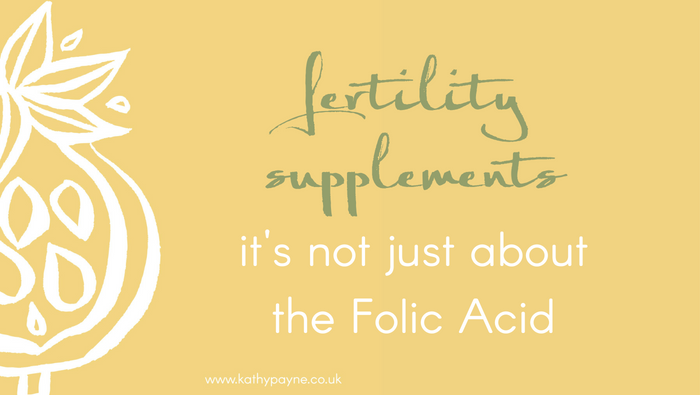Most people know that Folic Acid is good for any woman trying to get pregnant. That’s because doctors recommend it when a woman says she’s started trying.
And it’s important for a healthy pregnancy. BUT…
…it’s not enough on its own…
…AND there are other nutrients important to fertility and pregnancy.
Grab a brew. Pull up a pew. And read on. Here’s my own take on fertility supplements.
Fertility Supplements – Folic Acid and B Vitamins
Let’s start here.
Folic Acid is important for a healthy pregnancy; to support healthy growth of the baby’s spine and spinal cord and reduce the risks of spina bifida and other issues.
The vitamin is key between about 25-30 days after conception …when you may not know you’re pregnant. That’s why it’s recommended when you start trying for a baby – 3 months before you start trying is ideal.
It’s actually a B Vitamin. It’s called Folate. Deficiency is pretty common.
If you have tummy issues or diarrhoea you are more likely to be deficient.
Alcohol and certain meds, including The Pill rob us of B vitamins.
And there are other B Vitamins which work in harmony which is why just taking Folate may not be enough.
Folic Acid is linked to it’s sisters B6 and B12. For them to work, you need all of them. In the right balance.
Vitamin B6 supports a healthy immune system and protects against infection and cancer.
Some women take it to relieve PMS symptoms or regulate periods.
It reduces the risk of birth defects through chromosome damage.
Low B6 reduces B12 absorption and can contribute to B12 deficiency.
Vitamin B12 is important for sperm count and some studies show it helps reduce risk of miscarriage.
Vegans and vegetarians are at more risk of Vitamin B12 deficiency – so be very careful if you choose these diets and are planning a baby. I have a whole blog on that here.
Most doctors and the NHS website here in the UK advises…
400 micrograms (mcg) of Folic Acid each day, taken from before you are pregnant until you are 12 weeks pregnant.
But some experts say this may not be enough for some individuals, for example if you have diabetes, are overweight, you take anti-epilepsy medications or there is a history of neural tube defect in your families. Speak with your doctor, if you think this applies to you.
Guys need Folate too – either a folate rich diet or – again – supplements to boost sperm quality and fertility.
Other Key Fertility Nutrients
Vitamin D
When is a Vitamin not a vitamin? When it’s Vitamin D, which is actually a hormone! And we know that hormones are a complex system of interdependent chemical triggers, signals and responses.
Our bodies make Vitamin D when our skin is exposed to summer sunlight (from late March/early April to the end of September here in the UK).
It’s also in some foods, including oily fish (such as salmon, mackerel, herring and sardines), eggs and red meat. It’s added to some foods. It’s only found in small amounts in all food sources.
So everyone over the age of five years, including pregnant and breastfeeding women, should consider taking a daily supplement containing 10mcg of Vitamin D as D3 in the Northern Hemisphere winter.
Zinc
It’s a key fertility boosting nutrient of men and women. A lack can lead to hormone issues, fertility issues and increase miscarriage risk.
Its important in pregnancy for growth and cell division of the foetus.
It’s also needed for healthy sperm.
Selenium
Selenium supports development of the foetus and reduces risk of birth defects and miscarriage.
It’s also important for testosterone production in guys and for sperm health.
Selenium deficiency is generally more common these days; modern farming methods rob the soil of selenium.
Iron
Iron is needed for cell production and to carry oxygen – thats why you get tired when you lack iron: your body lacks oxygen. Not a lot of people know that!
It’s important that you have enough iron before trying to get pregnant but no need to supplement if you have healthy levels from a diet rich in poultry, fish, leafy greens, dried fruit and meat.
Vitamin C supports better absorption of iron.
Manganese
It’s needed for healthy skin, bone and cartilage formation and to regulate blood sugar. It helps control free radical damage, ageing and inflammation.
Some studies show that manganese deficiency leads to low fertility. It supports good egg and sperm quality.
Essential Fats
Most people have too many Omega 6 fats (generally vegetable oils) and not enough Omega 3 (oily fish, nuts and seeds, leafy greens and beans) from their diet.
Omega 3s are important for hormone balance and supporting your baby’s healthy development in the womb.
They are also important to reduce risk of miscarriage caused by blood clotting issues.
Many people would benefit from supplementation, including those trying to conceive.
Vitamin C
Keeps your motor running! And we have to get it from food because we can’t manufacture it.
It supports ovulation. It supports sperm quality.
Vitamin E
Did you know Vitamin E contains “tocopherols” – from the Greek word meaning to bear children! No wonder I’m including it under fertility supplements.
It really helps protect and boost female fertility.
It also increases sperm quality.
Vitamin A
This vitamin protects mucus membranes including our reproductive system – against infection and cell changes.
A word on Vitamin A. High doses from animal sources can increase the risk of birth defects, but veggie sources don’t carry the same risk.
Co-Enzyme Q10
This is contained in nearly all our cells! It’s needed for energy and metabolism.
It’s great for sperm motility or movement.
So as you can see, it’s not just Folic Acid for women that’s needed. There are a whole host of nutrients needed for fertility, reducing miscarriage risk and supporting the baby’s development.
For many people, diet alone will not provide good levels of these nutrients.
Fertility Supplements – How Do I Know What I Need?
But before you all rush out and buy up the Health Food Store supply of fertility supplements, be very careful.
YOU may not need ALL this stuff.
There can be TOO much of a good thing.
AND you should check with your doctor or pharmacist first that supplements are suitable for you.
It all depends on your diet, your ability to absorb nutrients and your general health and wellbeing.
Personally, I recommend my clients have their mineral levels checked and toxic metal load checked before starting to try for a baby. Or when people come to me and they’ve been struggling to fall pregnant. We do that through a hair sample.
That way, we can see what your nutritional status was over the months that hair was growing …we can see a trend. From there, we can tailor supplement recommendations and lifestyle advice.
Of course, your doc can take bloods and test for nutrients – that will show what’s circulating at the precise time of the sample rather than a trend.
So, I’m saying I think supplements should be tailored to the individual.
You could opt for a fairly standard programme and it might help, but it may not be sufficient for your needs.
Fertility Supplements – You Get What You Pay For
AND you get what you pay for with supplements,including fertility supplements.
Less expensive brands contain cheap fillers. They also tend to be made from ingredients our bodies find hard to absorb…because they are cheaper.
Avoid supplements where the minerals are made from oxides, sulphates and carbonates. Prefer minerals in the form of citrates.
Choose Vitamin D as D3. I choose one with added Vitamin K.
Buy B6 as pyridoxal-5-phosphate.
Have Vitamin C as ascorbate not ascorbic acid.
Fish oils can be tricky too. It’s not the amount of fish oil, it’s the breakdown of EPA and DHA that’s key.
There are some good quality supplement brands. You have to know what you’re looking for.
It’s a complex subject and a potential minefield once you start looking at it. It’s helpful to be guided through it.
So, that’s it, it’s not just about the Folic Acid.
Love,
If you value my hints and tips on protecting and boosting fertility, sign up to my totes FREE online programme 7 Steps To Boost Fertility …it’s ALL the basics of super self-care for getting baby-fit. Some of my hints and tips have proved pretty surprising.
And it’s easy peasy to access and use from your computer or tablet at home. You sign up and receive an e mail with a link to access the secure and private space online, which holds all the short videos and notes.
You can even listen to my classes on headphones so no-one knows you’re listening.



Recent Comments